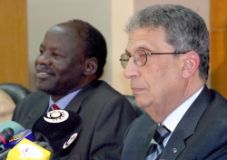Arab states likely to support Sudan’s rejection of Darfur UN forces
Oct 04, 2006 (CAIRO) — The United States is focusing on the Arab world as a way to get U.N. peacekeepers deployed in Darfur to stop the violence and provide humanitarian relief. But Arab countries are likely to support Sudan’s rejection of such a deployment, analysts say.
 U.S. Secretary of State Condoleezza Rice came out of a meeting with eight Arab foreign ministers in Cairo on Tuesday night and pleaded for the world to persuade Sudan to accept U.N. peacekeepers. Quoting U.N. reports on the worsening conditions in the western Sudan region, Rice said: “What is going on in Darfur now cannot be tolerated.”
U.S. Secretary of State Condoleezza Rice came out of a meeting with eight Arab foreign ministers in Cairo on Tuesday night and pleaded for the world to persuade Sudan to accept U.N. peacekeepers. Quoting U.N. reports on the worsening conditions in the western Sudan region, Rice said: “What is going on in Darfur now cannot be tolerated.”
“We need to work urgently to have the government of Khartoum accept what is now a U.N. Security Council resolution,” Rice added, referring to the resolution passed in August that would give the world body authority over the African Union peacekeepers in Darfur, enhancing their power to tackle the lawlessness and shortages of food and water.
But Sudan’s President Omar al-Bashir has repeatedly rejected U.N. forces in Darfur, saying they would be neocolonialists and violators of Sudanese sovereignty. His government has orchestrated mass demonstrations in Khartoum in support of that position.
Maamoun Fandy of the International Institute of Strategic Studies in London said the Arab League is unlikely to push Khartoum on Washington’s behalf unless the US changes its policy toward Israel.
“Darfur is horrific, but also what is taking place in Palestine … is horrific, so unless the menu includes movement on the Palestinian issue, the Arabs will not bite on that Darfur issue,” said Fandy.
Egyptian Foreign Minister Ahmed Aboul Gheit spoke alongside Rice on Tuesday and told reporters that the Palestinian issue was central to the Middle East’s problems.
“The Palestinian problem is the scourge of this region,” said Aboul Gheit, who added that a large part of Rice’s meeting with the six Arab Gulf states, Jordan and Egypt was devoted to Darfur.
While Rice stressed that the U.N.’s deployment in Darfur was no threat to Sudan’s sovereignty, Arab states do have real doubts about U.S. respect for their territories after the invasion of Iraq and the Israeli offensive in Lebanon, which Washington was seen to support, said Peter Woodward, professor of politics at Reading University in England.
Further, in Khartoum’s mind, “there is a fear that if they surrender a degree of sovereignty in Darfur, the danger is that it becomes an encouragement to others, perhaps in eastern Sudan, to take a similar line of violent resistance,” Woodward said, referring to opposition groups that have protested and rioted in the Port Sudan region.
In Sudan’s capital, the editor of the opposition newspaper, the Khartoum Monitor, says the government is not really concerned about Sudan’s sovereignty, and that most Sudanese know this.
“The majority of the Sudanese people know that the government is opposing the UN because it is afraid of losing power,” said Alfred Taban.
He said that while the government prohibits anti-government demonstrations in Khartoum and other parts of north Sudan, he attended two rallies in Juba, the capital of south Sudan, in September where southerners expressed support for a U.N. forces in Darfur.
The ruling party in south Sudan, the Sudan People’s Liberation Movement, and the three main rebel factions in Darfur have all called for a U.N. deployment. The SPLM’s leader, Salva Kiir Mayardit, holds the position of first vice president, and one of the Darfur factions is led by Minni Minnawi, who has made peace with the government and become an assistant to al-Bashir.
“Al-Bashir has rather backed himself into a corner at the moment,” Woodward commented. His position is opposed by “his own allies in the government, whom he seems to be ignoring — Salva Kiir and now Minni Minnawi.”
Analysts differ on what pressures could be applied to force the government to allow UN forces to take over the African Union mission, which is poorly equipped and under staffed for the Darfur crisis, where at least 200,000 people have died and about 2.5 million have been displaced since early 2003.
But they agree that the one major power with clout in Khartoum is China — the major foreign investor in Sudan’s oil fields.
So far, Beijing has come out in support of Khartoum’s position, saying UN peacekeepers can only be deployed with Sudan’s consent. But Woodward thinks this might not be the Beijing government’s final word.
“It has expressed concern and the wish to see things change in Darfur … and it must be worried that a continuance of violence in Darfur could threaten the stability of the country and China’s now-strong economic interests,” he said.
However, persuading China to lean on Sudan would be “very difficult,” said Fandy. “They are the only player in a sense in Sudanese oil, and they would not want to lose this.”
Hani Raslan of the Al-Ahram Center for Political and Strategic Studies, a Cairo think-tank, said the Arab states were pushing for Sudan and the United States to accept a compromise on Darfur. It would entail more peacekeepers and a new mandate, but they would serve under the AU flag, not the U.N.’s.
Editor Taban said such a compromise would not work as the AU has lost credibility in Darfur, and the government has rejected Nigerian proposals to strengthen the mandate.
Darfur requires both more troops and a tougher mandate, Taban argued, adding that Darfurians had told him what they really want is a NATO force such as the one that restored peace to Kosovo in 1999.
(AP/ST)
